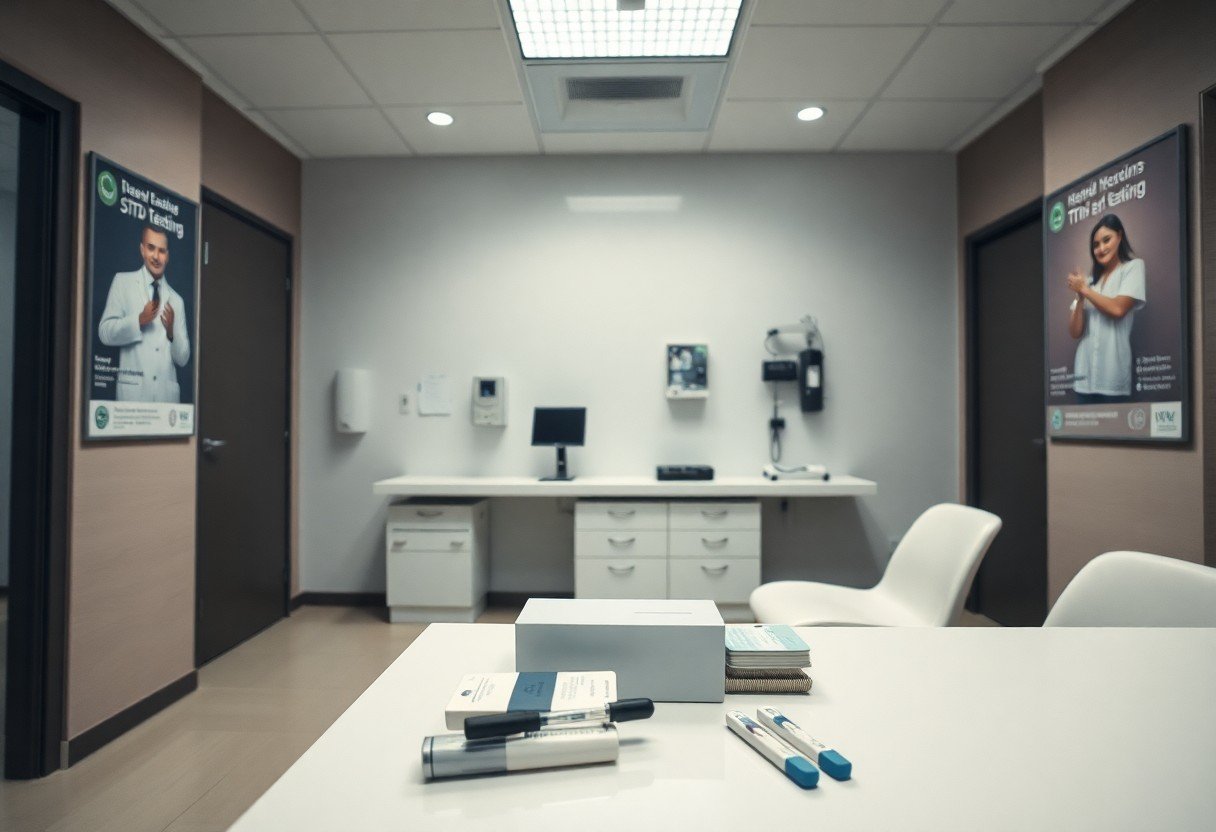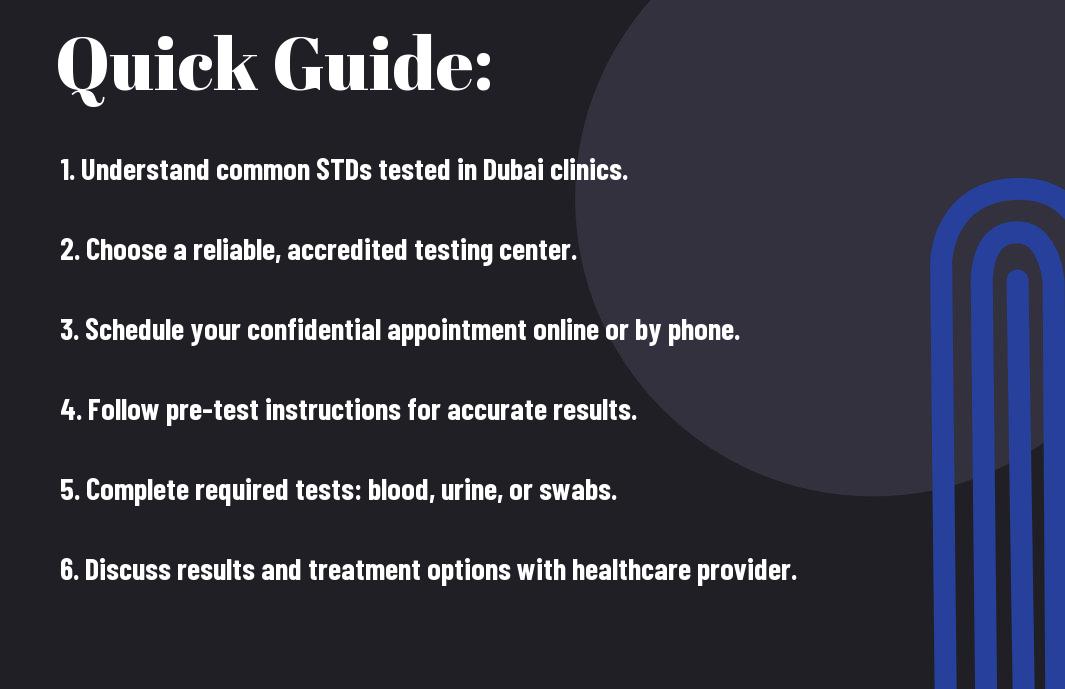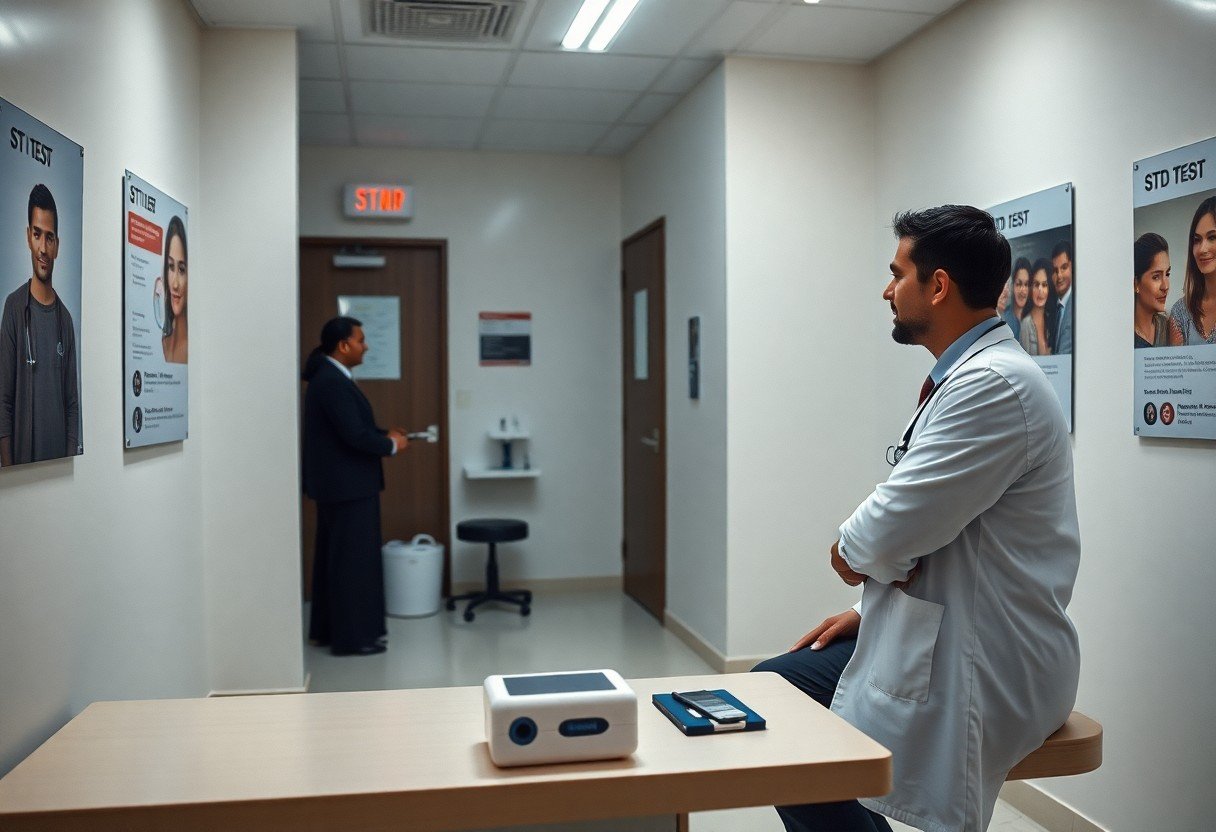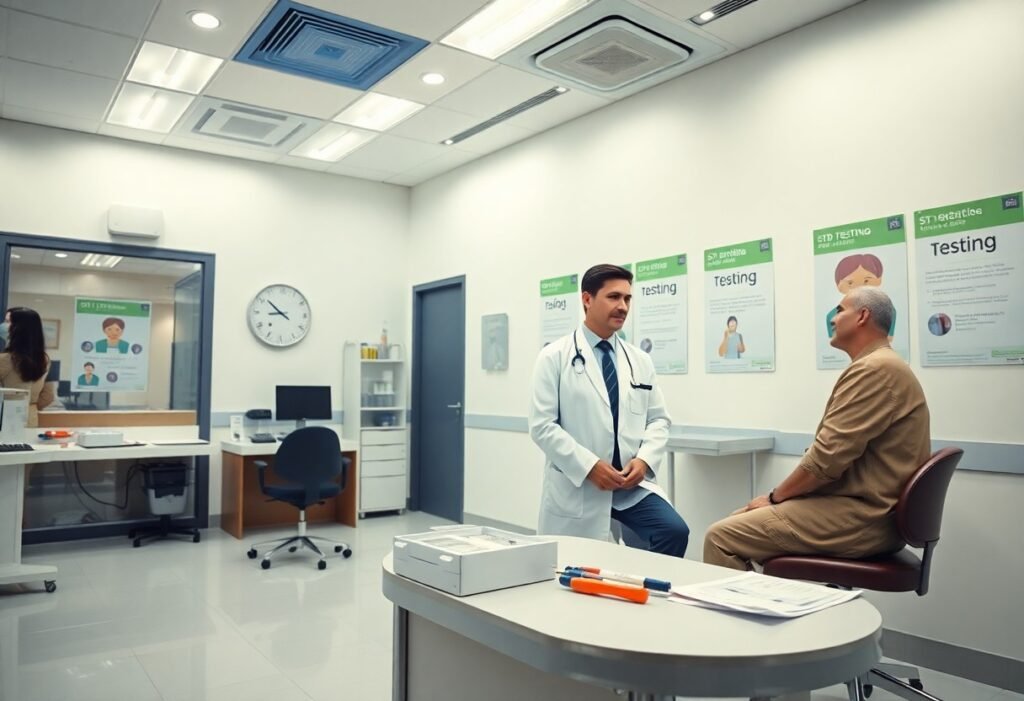Many individuals in Dubai seek reliable and confidential STD testing to ensure their sexual health. Understanding your testing options is vital, as it can help you detect any potential infections early and manage your health effectively. This comprehensive guide will provide you with crucial information about testing procedures, available clinics, and the importance of regular check-ups. Whether you are in a long-term relationship or exploring new connections, taking charge of your sexual health begins with informed choices about testing.

Key Takeaways:
- STD testing is widely accessible in Dubai, with various clinics and hospitals offering discreet and professional services for all individuals.
- It is important to know the types of STD tests available, including blood tests and swabs, to understand which tests may be relevant based on risk factors.
- Most clinics provide confidential testing and results, ensuring privacy for those seeking services.
- Insurance plans may cover STD testing; however, it’s advisable to check with your provider regarding coverage and out-of-pocket costs.
- Awareness of local laws and regulations regarding sexual health and STDs in Dubai is imperative for informed choices and practices.

Types of STD Tests
A variety of STD tests are available to successfully identify infections and keep you healthy. Each type of test serves a unique purpose, ensuring comprehensive evaluation. Here’s a brief overview:
| Type | Description |
| Blood Tests | Evaluate antibodies or antigens for various STDs. |
| Urine Tests | Detect bacteria or viruses through urine samples. |
| Swab Tests | Involve taking samples from affected areas. |
| Serological Tests | Analyze blood for past infections. |
| Rapid Tests | Provide quick results, often for HIV. |
Any of these tests can help you accurately determine your STD status and take appropriate actions.
Screening Tests
An necessary part of maintaining your health, screening tests are designed to identify infections before symptoms appear. These tests typically include urine samples, blood tests, and swabs from the genital area. Regular screening is vital, especially if you have multiple partners or experience new symptoms, as early detection can prevent complications.
Diagnostic Tests
Now, if a screening test reveals positive results or if you exhibit symptoms, diagnostic tests become necessary for confirming the presence of an infection. These tests provide detailed information about the specific pathogen affecting you and guide treatment options.
The accuracy of diagnostic tests is significant in identifying harmful infections, such as chlamydia, gonorrhea, and HIV. By employing methods like blood tests or swab cultures, you receive definitive answers that allow for timely and effective treatment. Addressing these conditions promptly is necessary, as delaying treatment can lead to severe health complications and emotional distress. Ensure you prioritize your health by seeking out diagnostic tests if any concerns arise.
Step-by-Step Guide to Getting Tested
It is necessary to understand the process of getting tested for STDs in Dubai. Follow this simple step-by-step guide for a smooth experience:
| Step 1: | Research and select a testing center. |
| Step 2: | Schedule an appointment, if necessary. |
| Step 3: | Prepare for your appointment as advised. |
| Step 4: | Attend the appointment for testing. |
| Step 5: | Wait for your test results. |
Finding a Testing Center
You can find a reliable testing center in Dubai by searching online or asking for recommendations from healthcare professionals. Look for clinics that specialize in sexual health, have good reviews, and provide confidentiality. Ensure that the chosen center offers a variety of tests to suit your individual needs.
The Testing Process
Finding the right testing process is key to receiving accurate results. You may undergo a physical examination and provide samples, such as blood or urine, based on the tests required. The healthcare professional will guide you through each step, ensuring you are comfortable. After testing, it generally takes a few days to receive your results, and quick and accurate diagnosis is vital for your health.
A comprehensive testing process is vital for early detection and treatment of STDs. It’s important to disclose your symptoms or any potential exposures to the healthcare provider, as this will help them recommend specific tests. After your samples are collected, the lab analyzes them for possible infections, including HIV, chlamydia, or gonorrhea. Receiving timely results can significantly impact your treatment options and overall health, so stay proactive about your sexual health.

Tips for Preparing for Your Test
Your preparation for an STD test can significantly impact the accuracy of your results. Consider the following tips:
- Schedule your test during a time when you can avoid sexual activity for at least 24 hours.
- Avoid alcohol and drugs for 24 hours prior to testing.
- Stay hydrated; drink plenty of water before the test.
- Bring your identification and details of your health insurance, if applicable.
Though being prepared will help you feel more at ease during your appointment.
Pre-Test Considerations
Any personal factors can affect your test results, including the timing of the test and your recent sexual history. Ensure you have an open and honest discussion with your healthcare provider about any symptoms you might have experienced. Knowing whether you’ve had unprotected sex or multiple partners recently can provide vital context for your testing.
What to Expect During the Test
Preparing for your STD test means knowing what will happen during the appointment. Here’s what to expect:
To start, the healthcare provider will likely ask you questions about your sexual history and any symptoms you’ve experienced. Testing may involve a blood sample, a urine sample, or a physical examination, depending on the STDs being tested. You might experience slight discomfort, but overall the process is quick and straightforward. The results typically take a few days, and your provider will discuss what they mean for your sexual health. It’s vital to stay calm and ask any questions you may have throughout the process.
Factors Influencing STD Testing
Now, various factors can impact your decision to undergo STD testing. These include your sexual activity, relationship status, and symptoms you may be experiencing. Additionally, awareness of healthcare services and accessibility in your area plays a vital role. It’s also necessary to consider your age and overall health background. Any delays in testing can lead to complications.
Risk Factors
For many, understanding the risk factors associated with STDs is vital in determining when to get tested. These factors can include:
- Number of partners
- Unprotected intercourse
- Previous STD history
- Substance abuse
- Partner’s sexual health
Knowing these aspects can guide you in assessing your own risk and deciding when to seek testing.
Frequency of Testing
Assuming you engage in high-risk behavior or have multiple sexual partners, the frequency of testing becomes necessary. For sexually active individuals, it is typically recommended to get tested at least once a year. However, if your lifestyle changes or you have new partners, consider more frequent testing to ensure your health and the safety of others. Regular screening not only helps in early detection but also significantly reduces the chances of transmission.
Testing for STDs should be part of your routine healthcare if you fall into high-risk categories. Many recommend testing every three to six months for those with multiple partners or who engage in unprotected intercourse. By prioritizing regular STD checks, you contribute not only to your own health but also to the well-being of your partners. Staying proactive with your sexual health can lead to peace of mind and stronger relationships.
Pros and Cons of STD Testing
Not every decision comes without its drawbacks. Understanding the pros and cons of STD testing is vital for informed choices regarding your health.
| Pros | Cons |
|---|---|
| Early diagnosis of infections | Potential anxiety while waiting for results |
| Access to appropriate treatment | Possible discomfort during tests |
| Reduction in transmission rates | Stigma associated with testing |
| Improved sexual health | Costs of testing |
| Peace of mind | Confidentiality concerns |
Benefits of Early Detection
Even a simple STD test can have significant benefits. Early detection allows for timely intervention, which can prevent serious health issues, including complications that arise from untreated infections. It not only preserves your health but also helps in reducing the risk of transmission to others.
Possible Discomfort and Emotional Considerations
Any medical procedure may come with a degree of discomfort, including STD testing. You might experience anxiety before, during, or after the testing process, and feelings surrounding your results can evoke a range of emotions. It’s vital to acknowledge these feelings and seek support if needed.
Considerations regarding possible discomfort can vary based on the type of test being conducted. While some tests may involve a quick blood draw or swab, others may lead to slight pain or sensations that can be unsettling. Additionally, the emotional aspect of receiving results can lead to feelings of fear or shame, particularly if your results are not what you expected. It’s vital to remind yourself that understanding your status can empower you to take control of your health and relationships, potentially leading to a more positive outcome.
Aftercare and Follow-Up
After testing for STDs in Dubai, it’s vital to engage in appropriate aftercare and follow-up services. You should adhere to your healthcare provider’s advice regarding any medications or treatments prescribed. Regular follow-up appointments are vital for monitoring your health and ensuring all tests are accurately processed. Don’t hesitate to reach out for support if you have questions or concerns about your results, as maintaining open communication can greatly enhance your wellbeing.
Understanding Your Results
Your test results will typically indicate whether you have an STD or if further testing is needed. It’s important to thoroughly comprehend what the results mean and discuss them with your healthcare provider, who can clarify any uncertainties. Understanding your results will enable you to make informed decisions regarding your health.
Next Steps if Positive
Little changes in your health status can prompt significant adjustments in your approach to STD management. If your test comes back positive, swift action is required to address the issue and minimize further complications.
Steps following a positive STD result involve scheduling a follow-up appointment with your healthcare provider as soon as possible. They will discuss treatment options and management strategies tailored to your specific infection. It’s vital to inform any sexual partners about your diagnosis to enable them to seek testing and treatment as well. Additionally, consider accessing support groups or counseling services, as a positive STD result can be overwhelming, and having a support system in place can significantly aid your emotional wellbeing.
Conclusion
Hence, understanding the nuances of STD testing in Dubai empowers you to take charge of your sexual health with confidence. Whether you’re seeking routine testing or have specific concerns, knowing where to go and what to expect is vital. For professional and confidential services, explore options for an STD Test in Dubai | Confidential & Professional, ensuring your peace of mind and well-being.
FAQ
Q: What are the common STDs that can be tested for in Dubai?
A: In Dubai, you can be tested for a variety of sexually transmitted diseases (STDs). Common tests include checking for chlamydia, gonorrhea, syphilis, herpes, and HIV. Many clinics also offer testing for hepatitis A, B, and C. It is important to consult with a healthcare provider to determine which tests are appropriate based on your sexual history and risk factors.
Q: Where can I get tested for STDs in Dubai?
A: Testing for STDs in Dubai can be conducted at various locations, including private clinics, hospitals, and specialized STD testing centers. Many healthcare providers maintain confidentiality and offer discreet services. You may also find mobile clinics that perform on-site testing in some areas. It’s advisable to do some research and choose a reputable facility for testing.
Q: How long does it take to receive STD test results in Dubai?
A: The time it takes to receive STD test results in Dubai varies based on the type of test conducted and the facility you visit. Generally, results for common tests like chlamydia and gonorrhea may be available within a few hours to a couple of days. More complex tests, such as HIV or syphilis, may take a bit longer, usually between 1-7 days. When you undergo testing, the clinic will provide you with information on when and how you can receive your results.
Q: Is STD testing confidential in Dubai?
A: Yes, STD testing is typically confidential in Dubai. Most healthcare providers prioritize patient privacy and take measures to ensure that your personal information is protected. It’s best to discuss any concerns about confidentiality with your healthcare provider beforehand to understand their privacy policy and address any questions you might have.
Q: What should I expect during an STD test in Dubai?
A: During an STD test in Dubai, the process may involve answering questions about your sexual history and any symptoms you may be experiencing. Depending on the tests being conducted, the procedure could involve a physical examination, blood samples, urine samples, or swabs from affected areas. The healthcare professional will explain what the tests entail, ensuring you are comfortable throughout the process. It’s also an opportunity to ask any questions you may have regarding your sexual health.

